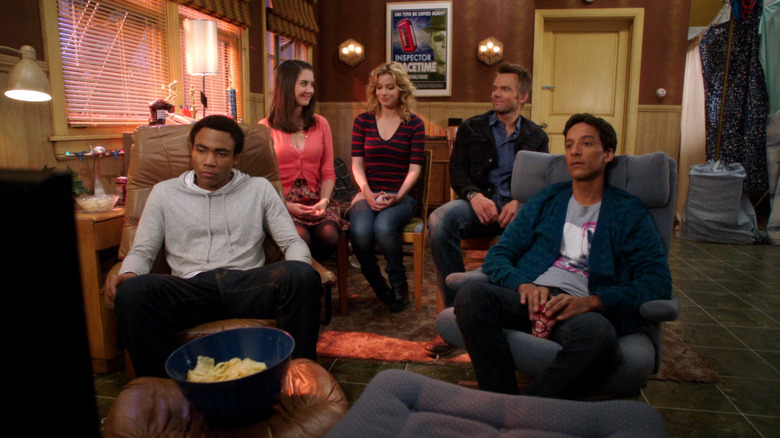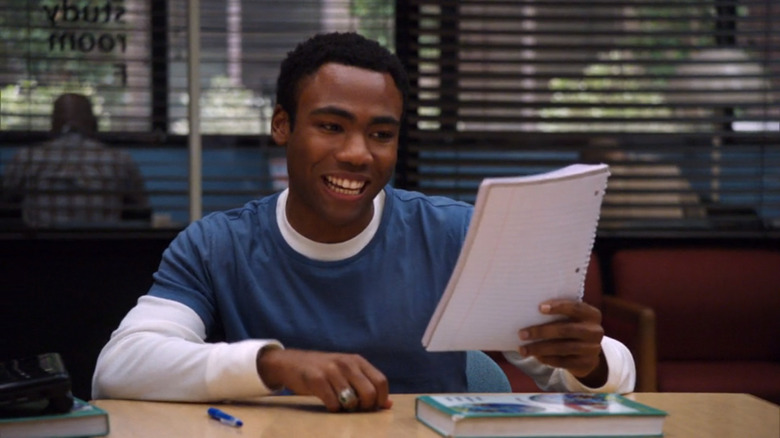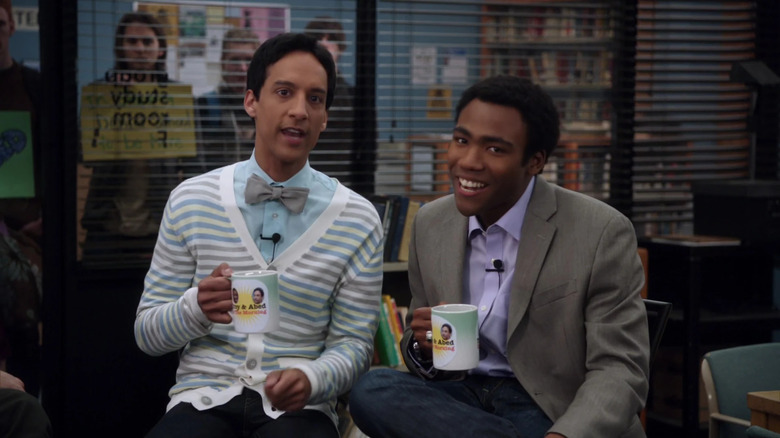How Fan Reactions Shaped Community (And Why Rick And Morty Ignores Them)
There have been plenty of stories of fandoms influencing the thing they love over the years, but it's rare for fans and the creator to be in direct conversation with one another. That magically happened during the making of the cult NBC series "Community," and showrunner Dan Harmon loved taking fan feedback and incorporating it into the series. When it comes to his other series, "Rick and Morty," engaging with the fans in the same way just isn't possible for a few reasons. In an interview with MSNBC, Harmon explained how "Community" was perfectly poised to work with fan feedback, but times have changed, and animation is a totally different beast.
While it would be neat if every show could have that kind of back-and-forth between creators and fans, that's a whole lot of power given to the audience instead of the artist. Harmon would have been fully within his rights to ignore the fans entirely, but we're lucky that we got the "Community" that we did. The engagement with the fans meant that things fans loved, like "Troy and Abed in the Morning," got more time to shine, and it never quite veered into the realm of all-out fanservice. Then again, given the way the "Rick and Morty" fandom reacted about a Szechuan sauce shortage, maybe it's a good thing that Harmon isn't giving them any control of the ship. At least with the "Community" movie purportedly on the way, we know we'll get to see Harmon try to appease all of us Human Beings one last time.
'The culture has changed'
Harmon explained that he used Twitter early on to see what the fans were thinking, and he utilized that feedback in the writers' room:
"'Community' was very much defined by the amount of feedback and the very tight loop. I valued it. It was a completely different time in the culture of TV. It was a different-sized audience. There was very much a kind of warmth to the message of the show that trickled down to the hardcore fan. And it, for me, at that time, it was exhilarating and, I think, profitable to the show for me to literally sit and watch the show with my laptop open and watch people watch the show. Better than any focus group. Because what are they doing? Well they only had 140 characters back then. So what they would do is they would repeat jokes that they liked, or just – you only have so much you can express in a tweet in real time, and those were emotionally sincere, real-time responses to the character of Troy or the relationship with him and Abed."
Live-tweeting along with the airing of a new show is still very much a thing, but it sounds like having more characters (and a more complicated Twitter experience in general) made the reactions feel less spur-of-the-moment or genuine to Harmon. There's also just the sheer number of Twitter users to think of: the site had around 18 million users in 2009, when "Community" first aired, while it currently has closer to 350 million users. That's a pretty massive change in the number of interactions to sift through, and it means that the fans can become truly overwhelming.
Different tactics for a different time
Back in 2009, Harmon would lean into what the fans liked and tweeted about, but doing that on "Rick and Morty" would be significantly more difficult. After all, "Community" was shot on a typical sitcom schedule with a quick turnaround, which meant that incorporating fan reactions was fairly simple. He explained that "Community" was usually filmed and then aired about a month and a half later, which is pretty "close to real time." On the other hand, "Rick and Morty" is animated and takes a lot longer, and that had a hand in how Harmon's methods changed as well:
"I don't do that anymore, partly because the culture has changed. And I mean, the consumption of TV as an activity online has become as hardcore and as potentially dangerous as any hobby. And to just blindly bound in and go, 'Let's play! I'll be the creator, you be the audience, let's all exchange thoughts together about how the show's going!' I think it's a – I don't know if I'd do that if I launched Community tomorrow, let alone an animated show that takes two years to make."
Both "Rick and Morty" and "Community" play with meta humor pretty frequently, through Abed's (sorta) breaking of the fourth wall and Rick's direct breaking of it, which allows for Harmon and the other writers to interact more directly with the show itself and the fans. They might not get to do it as quickly with "Rick and Morty," but given Harmon's explanations as to why, it's hard not to blame them.


